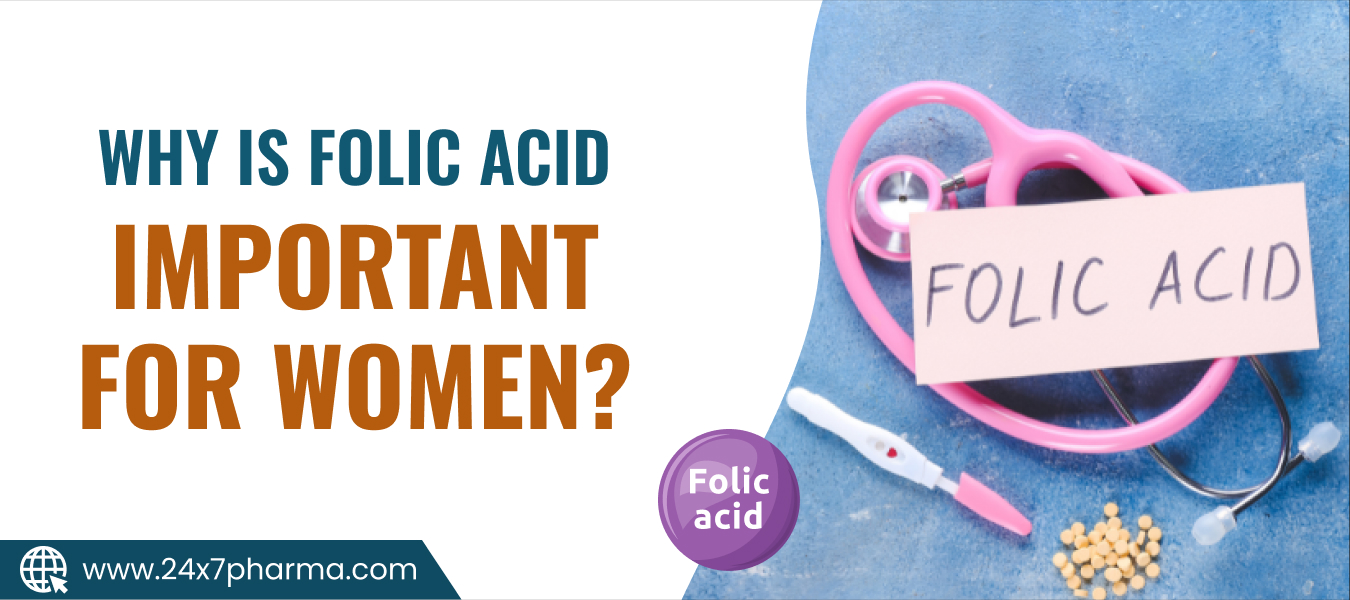Folic acid is a synthetic form of folate, a type of B-vitamin (B9) that plays a vital role in many body functions, including DNA synthesis and cell growth. Folate is naturally found in various foods, while folic acid is the version commonly added to supplements and fortified foods. Both folate and folic are essential nutrients, particularly for women, due to their significant impact on reproductive health, energy levels, mental well-being, and overall physical health. Whether you’re pregnant, planning to conceive, or simply aiming to maintain a balanced lifestyle, folic acid can make a powerful difference in your health.
Why Folic Acid is Important for Women?
It is especially important for women due to its critical role in pregnancy, as well as its influence on other aspects of health. One of the most crucial functions of folic is its ability to prevent neural tube defects, which are severe birth defects of the brain and spine that occur in the earliest stages of pregnancy. Studies have shown that getting enough folic acid before and during pregnancy can reduce the risk of these defects by up to 70%.
But folic isn’t only important for women who are pregnant or planning to become pregnant. It also contributes to general health and well-being for all women. Folic aids in red blood cell formation, which can help prevent anemia, a common condition among women that leads to fatigue, weakness, and pale skin. Additionally, folic acid supports heart health by helping to break down homocysteine, an amino acid that, in high levels, can increase the risk of heart disease and stroke. Regular intake of folic acid can also help improve mood and cognitive function by supporting neurotransmitter production, which is crucial for mental health.
How Liquid Folic Acid Works?
Liquid folic acid is an alternative form of this essential nutrient that is taken in liquid form rather than as a pill or tablet. This method of consumption can be particularly beneficial for women who have difficulty swallowing pills, who have gastrointestinal issues that may affect absorption, or who simply prefer a more versatile option for their supplements.
When you take liquid folic, it is quickly absorbed into the bloodstream, which may lead to more efficient and faster utilization by the body. Some experts believe that liquid supplements can be absorbed more readily than tablet forms because they bypass some of the digestive processes required to break down solid tablets. For women with digestive concerns or absorption issues, liquid folic can offer a more reliable way to ensure they are getting the recommended amount of this crucial nutrient.
What are the Benefits of Folic Acid?
- Supports Healthy Pregnancy: Folic acid is essential for fetal development and reduces the risk of birth defects, particularly neural tube defects, which can lead to conditions like spina bifida and anencephaly. This makes folic acid a critical nutrient for women of childbearing age, as these defects develop in the very early stages of pregnancy, often before a woman even knows she is pregnant.
- Prevents Anemia: Folic acid is vital in red blood cell production. A lack of folic can lead to folate-deficiency anemia, resulting in symptoms like fatigue, weakness, and shortness of breath. For women, who often experience iron deficiency due to menstruation, adequate folic levels can help support red blood cell formation and prevent these symptoms.
- Promotes Heart Health: Folic acid helps regulate homocysteine levels in the blood. Elevated homocysteine is associated with a higher risk of heart disease, as it can damage the lining of arteries and increase the likelihood of blood clots. By helping to break down homocysteine, folic acid contributes to a healthier cardiovascular system.
- Enhances Mood and Mental Health: Folic acid plays a role in the production of neurotransmitters, which are chemicals that regulate mood and cognitive functions. Low levels of folate have been linked to an increased risk of depression, anxiety, and even cognitive decline. Ensuring sufficient folic acid intake can have a positive effect on mental well-being.
- Boosts Skin, Hair, and Nail Health: Folic acid helps with cell growth and regeneration, which can lead to healthier skin, stronger hair, and resilient nails. This is particularly important for women who are concerned about aging and maintaining a youthful appearance.
Natural Sources of Folic Acid in Foods
While folic is available as a supplement, it can also be found in many foods, particularly those rich in natural folate. Including these foods in your diet can help ensure you meet your daily folate needs naturally:
- Leafy Green Vegetables: Spinach, kale, and other leafy greens are rich in folate and make excellent natural sources of this essential nutrient.
- Citrus Fruits: Oranges, grapefruits, and lemons contain significant amounts of folate.
- Beans and Legumes: Lentils, black beans, chickpeas, and peas are packed with folate.
- Avocado: This versatile fruit is not only high in healthy fats but also provides a good amount of folate.
- Nuts and Seeds: Sunflower seeds, peanuts, and almonds are great plant-based sources of folate.
- Fortified Grains: Many types of bread, pasta, and breakfast cereals are fortified with folic acid, providing an easy way to get more in your diet.
Eating a balanced diet that includes these folate-rich foods, along with a supplement if needed, can help ensure you’re getting enough folic.
Why is Folic Necessary?
Folic is essential for overall health, but for women, it’s even more critical due to the demands of reproduction, hormonal changes, and unique health needs. The body does not naturally produce folate, so it must be obtained through diet or supplements. However, because it’s water-soluble, the body doesn’t store it well, meaning regular intake is essential to maintain optimal levels.
Folic is necessary not just to support pregnancy but also to safeguard against a range of health conditions. For women at any stage of life, folic acid contributes to better energy, reduced risk of anemia, improved mental health, and even a lowered risk of certain cancers.

